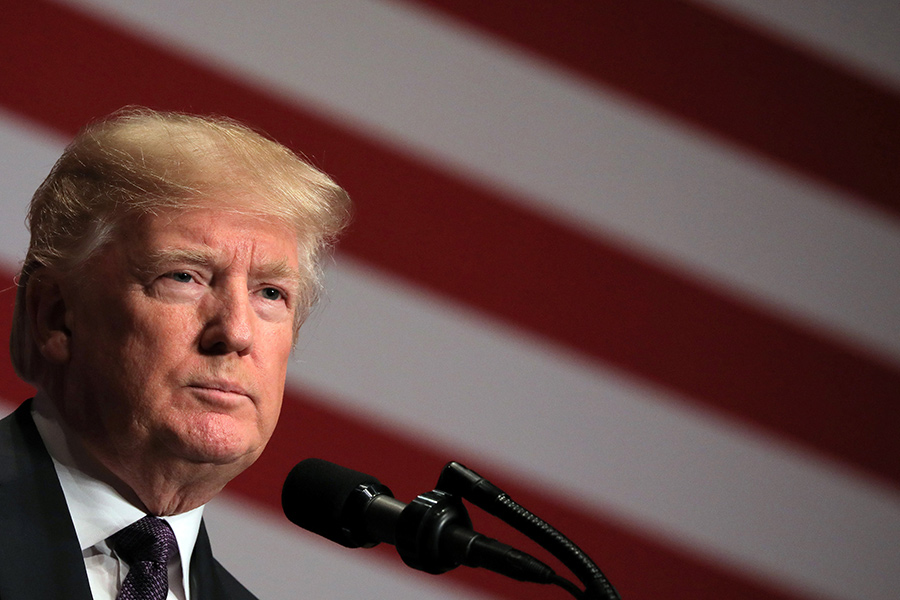Media Report

- The New York Times reports: "President Trump's first national security strategy envisions a world in which the United States confronts two 'revisionist' powers — China and Russia — that are seeking to change the global status quo, often to the detriment of America's interests. But while the document outlines a detailed plan to push back against China's global economic ambitions, it says little about dealing with the kind of cyber and information warfare techniques that Moscow used to try to influence the 2016 presidential election. The strategy, which Mr. Trump plans to present in a speech on Monday afternoon, is the first comprehensive effort by his administration to describe an all-encompassing strategic worldview. Administration officials said it was drawn from speeches Mr. Trump had delivered during the presidential campaign, in Europe and Asia and at the United Nations. It describes a world that was on a three-decade holiday from superpower rivalry, and suggests that holiday is over. 'After being dismissed as a phenomenon of an earlier century, great power competition returned,' the document says. It then tries to lend intellectual coherence to a foreign policy that is often defined by Mr. Trump's tweets or his gut instincts about which world leaders are strong, which are weak and which are prepared to cut a deal."
- Reuters reports: "China's Foreign Ministry on Monday defended trade with the United States as a win-win scenario ahead of a speech by U.S. President Donald Trump laying out a new national security strategy that makes clear that China is a competitor. Trump has praised Chinese President Xi Jinping while also demanding that Beijing increase pressure on North Korea over its nuclear program and changes in trade practices to make them more favorable to the United States. Chinese Foreign Ministry spokeswoman Hua Chunying said she was unable to comment on the strategy until it was unveiled. But in principle, China hopes the strategy can play a constructive role in promoting world peace and stability and promoting China-U.S. strategic mutual trust, Hua told a daily news conference. The essence of China-U.S. trade and economic ties is mutually beneficial and win-win, directly and indirectly supporting 2.6 million U.S. jobs, she added. In 2015, the profits of U.S. firms that invested in China reached $36.2 billion, and China will continue to support trade and investment liberalization."
- The Washington Post comments: "Step by step, China has been rolling out surveillance technology that is remarkably intrusive, comprehensive and ubiquitous. Eager to exploit gains in technology, Beijing seems little concerned about human rights or privacy violations... China seeks to build the world's largest camera surveillance network, with 170 million closed-circuit cameras installed and an estimated 400 million new ones coming in the next three years... Meanwhile, Human Rights Watch reported on Dec. 13 that Chinese authorities have been collecting DNA samples, blood types, fingerprints and iris scans, in some cases possibly without informing people, from a large swath of the population in the restive Xinjiang province in far northwestern China. Ethnic Uighurs in Xinjiang have long complained about repression and discrimination at the hands of the Chinese government; resentment has sometimes turned violent. According to Human Rights Watch, in a procedure rolled out this year, the authorities there are collecting the DNA and blood-type information under the cover of a 'free annual physical exams program called Physicals for All'... such widespread collection of intimate data as DNA can be a serious human rights and privacy violation."
Calendar
- 2017-12-17 Trade tussle with China tests the global system
- 2017-12-15 China Is Still Building on Disputed Islands in the South China Sea
- 2017-12-14 China’s ‘long arm’ of influence stretches ever further
- 2017-12-13 Tillerson's new North Korea strategy praised by China and Russia — but undermined by Trump
- 2017-12-12 Why China Won't Cut Off North Korea’s Oil Lifeline
- 2017-12-11 China volatility darkens 2018 investment outlook
- 2017-12-10 Once the WTO's Biggest Supporter, US Is Its Biggest Skeptic
- 2017-12-08 China’s commodity demand picks up in November
- 2017-12-07 China criticizes India over drone crash inside border
- 2017-12-06 No. 3 Person of the Year 2017: Xi Jinping
News
- The New York Times Trump National Security Strategy Sees U.S. Confronting China and Russia
- Reuters China defends trade with U.S. as Trump set to brand it a competitor
- Fox News UN rights chief: China, White House seem 'hostile' on rights
- The Wall Street Journal China's HNA Group Seeking Sale of $6 Billion in Overseas Property
- Quartz The future of grocery shopping has arrived in China
- Financial Times China shakes the world
- Bloomberg Iron Ore Powers Higher as China's Clean-Air Push Boosts Demand
- ABC News China's warplanes hold drill near Japan, South Korea, Taiwan
- CNBC China's Nio takes on Tesla with a car half the price of Model X
- CNBC China's Tencent, JD.com invest $863 million in online retailer Vipshop
- Bloomberg China's New Policy Will Move Solar Closer to Where It's Needed
- Financial Times China property price growth slows to 21-month low
- Bloomberg Coal's Two-Year Rally to End in Europe as China Demand Fades
Commentary
- The Washington Post China's intrusive, ubiquitous, scary surveillance technology
- Fox News Trump needs to stand up to China, despite our confrontation with North Korea
- The Economist What 2018 has in store for the markets
- The Washington Post How China got a U.S. senator to do its political bidding
- Forbes Will China Be the Winner in VR/AR?
- Bloomberg Let China's Workers Roam Free
- War On The Rocks What a Lawmaker's Downfall Reveals About Australian Attitudes on China
